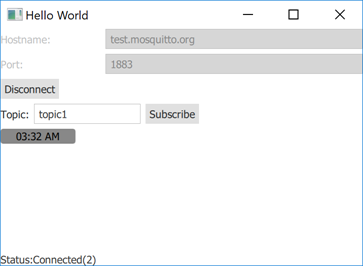Quick MQTT Example
Registering QMqttClient to QML and using it in a Qt Quick user interface.

Quick MQTT demonstrates how to register QMqttClient as a QML type and use it in a Qt Quick application.
Qt MQTT does not provide a QML API in its current version. However, you can make the C++ classes of the module available to QML.
Creating a Client
We create a QmlMqttClient class with the QMqttClient class as a base class:
QmlMqttClient::QmlMqttClient(QObject *parent) : QObject(parent) { connect(&m_client, &QMqttClient::hostnameChanged, this, &QmlMqttClient::hostnameChanged); connect(&m_client, &QMqttClient::portChanged, this, &QmlMqttClient::portChanged); connect(&m_client, &QMqttClient::stateChanged, this, &QmlMqttClient::stateChanged); }
We use the subscribe() function to create a subscription object:
void QmlMqttClient::connectToHost() { m_client.connectToHost(); }
We connect to QMqttSubscription::messageReceived( ) to receive all messages sent to the broker:
void QmlMqttClient::disconnectFromHost() { m_client.disconnectFromHost(); }
We use an QMqttMessage object to store the payload of a received message:
void QmlMqttSubscription::handleMessage(const QMqttMessage &qmsg) { emit messageReceived(qmsg.payload()); }
Registering Classes in QML
In the main.cpp file, we register the QmlMqttClient class as a QML type, MqttClient:
int main(int argc, char *argv[]) { QGuiApplication app(argc, argv); QQmlApplicationEngine engine; qmlRegisterType<QmlMqttClient>("MqttClient", 1, 0, "MqttClient");
In addition, we register the QmlMqttSubscription class as an uncreatable type:
qmlRegisterUncreatableType<QmlMqttSubscription>("MqttClient", 1, 0, "MqttSubscription", QLatin1String("Subscriptions are read-only"));
We can now use the MqttClient type in the main.qml file to create an MQTT client:
MqttClient { id: client hostname: hostnameField.text port: portField.text }
Files:
© 2023 The Qt Company Ltd. Documentation contributions included herein are the copyrights of their respective owners. The documentation provided herein is licensed under the terms of the GNU Free Documentation License version 1.3 as published by the Free Software Foundation. Qt and respective logos are trademarks of The Qt Company Ltd. in Finland and/or other countries worldwide. All other trademarks are property of their respective owners.